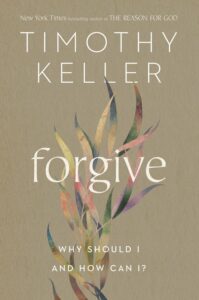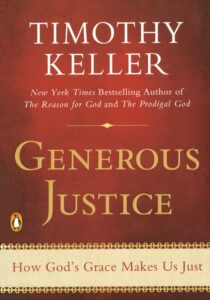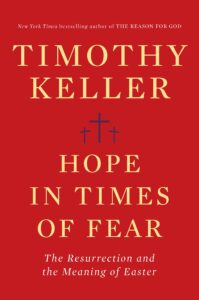In the last BookNotes post I listed some books about the cross of Christ, atonement theories, a few about a theology of resurrection. Most were somewhat heady but I know that BookNotes readers are more willing than many to read widely and to dig deep. (Granted, Greg Beale’s thick, new Union with the Resurrected Christ: Eschatological New Creation and New Testament Biblical Theology is very academic and pretty expensive, even at our sale price.) From Fleming Rutledge’s magisterial The Crucifixion to her big collection of Holy Week sermons, The Undoing of Death, to a host of other books (old and new) we made some important recommendations.
In this relatively short BookNotes hitting your inboxes, as it does, during Holy Week, I want to suggest two very good reads, thoughtful books that are clearly written, combining cultural awareness and theology that can be applied in the deepest part of your own heart. They are about how gospel-centered faith relates to some particular aspects of what Michael Gorman calls “the cruciform life.”
I want to recommend Timothy Keller’s most recent hardback Forgive: Why Should I and How Can I? alongside his older, succinct, Generous Justice: How God’s Grace Makes Us Just.
You can scroll down to the end to find the link to our secure order form where you can safely enter credit card info. There, you can tell us how you want them shipped, too. All books mentioned are 20% off, making them cheaper than some big-name internet sites.
Both books, I might add, can be better understood by first reading his excellent Hope In Times of Fear: The Resurrection and the Meaning of Easter which is not only an apologetic for the historicity of the resurrection but a fleshing out of its meaning for contemporary hope. It is profound, showing how to find a realistic and irrepressible hope. Written during his hard struggle with serious cancer, it is really quite a book!
 Forgive: Why Should I and How Can I? Timothy Keller (Viking) $27.00 OUR SALE PRICE = $21.60
Forgive: Why Should I and How Can I? Timothy Keller (Viking) $27.00 OUR SALE PRICE = $21.60
In typical Keller fashion, this new book starts with the big picture and places the Biblical call to forgive in the contemporary cultural context, which is to say, he highlights the current resistance to notions of forgiveness that are prevalent these days. With some degree of apparent sympathy he asks along with social activists and New York Times columnists and respected contemporary ethicists if, in fact, forgiveness — especially the Biblical assumption that we ought to forgive — is not, after all, finally part of the problem. He gives these voices a fair amount of space (even if one knows, surely, it is a bit of a set up as he will soon enough counter their logic and the consequences of their unapologetic worldview.)
Still, this is good at least for two reasons: religious readers who are not in tune with the times maybe ought to hear what some of our leading thinkers are saying about this well-loved bit of pious teaching and, as Keller at least somewhat admits, there really is something to this line of thought: too often the call to forgive has been harmful, especially to victims of abuse — sexual, domestic, racial. We dare not jump to quaint forgiveness without grappling with the real-world consequences of such seemingly noble virtue.
Also, as Keller often does, he shows not only what the culture thinks about Christian teaching, but shows how their insights — through God’s common grace perhaps — are onto something, and can shape a more mature and sophisticated view of the topic under consideration. So, in Forgiveness, the subtitle “why should I?” is taken seriously. He makes his case judiciously and powerfully.
Keller observes:
We live in a world where canceling, ghosting, and insults are the norm. You will experience snubs on a regular basis, and in some cases will experience real injustice. How are you going keep it all from turning you into a wraith controlled by the past? You must forgive and forgive well.
Forgive well? What does that mean? Well, he covers all this — including the copious and fascinating footnotes — in just over 250 pages!
He gives these sort of principles and steps, though, in summary:
We must name the trespass truthfully as wrong and punishable, rather than merely excusing it. Second, (he notes), we must identify with the perpetrator as a fellow sinner rather than thinking how different from you he or she is. It is to will their good. Third, it is to release the wrongdoer from liability by absorbing the death oneself rather than seeking revenge and paying them back. Finally, it is to aim for reconciliation rather than breaking off the relationship forever.
There is, throughout, plenty of Bible teaching. He unpacks popular (and lesser known) Biblical teachings, deftly retelling a parable of Jesus in the setting of those working in the world of contemporary finance. There’s a lot of inspiring Scripture here.
Importantly, like most of Keller’s work, he is what has come to be called “gospel-centered.” That is, the very core teachings of the gospel — in this case, that we are forgiven through the Christ who offers His life for ours — are the very mechanism by which we are able to forgive wisely.
We have a “faith-sight” of Jesus’s costly sacrifice. As he explains, “That reminds us that we are sinners in need of mercy like everyone else, yet it also fills the cup of our hearts with his love and affirmation. That makes it possible for us to forgive the perpetrator and then go speak to him or her, seeking justice and reconciliation if possible.”
You see, this is a book, finally, about the cross, about atonement — that makes possible our own at-one-ment, as I sometimes put it, with others in a fallen and bruising world. He is not a pacifist and he is certainly not unrealistic. But he knows that only the good news of the gospel itself, related, of course, to the very death and resurrection of Christ Himself, is at the very heart of Christian living.
From his book on suffering to his book on resisting idolatry, from his masterpiece on work to his good guidebook on prayer, Keller comes back to the first things of the gospel over and over. He is considered a culturally-aware and trenchant observer of the modern zeitgeist; this is true. Yet, he offers a gracious and good bit of Kingdom insight about faithful Christian living in the world by primarily preaching the gospel and applying its riches and implications to the quandaries of daily living.
He draws on such a wide variety of authors and insights (from Nicholas Wolterstorff to Gregory Jones to Rachel Denhollander) but, nicely, returns to the mere Christianity of C.S. Lewis. He reminds readers of the great quote from Mere Christianity, noting that redemption is not the same as self-improvement. We can’t merely will ourselves to do the right thing, to be righteous. It isn’t like (as Lewis delightful puts it) trying to badger a horse into flying. Rather, it is more “like turning a horse into a winged creature.” Lewis continues:
Of course, once it has got its wings it will soar over fences which could never been jumped and thus beat the natural horse at its own game. But there may be a period, while the wings are just beginning to grow, when it cannot do so: and at that stage the lumps on the shoulders — no one could tell by looking at them that there are going to be wings — may even give it an awkward appearance.
Forgive offers a compelling overview of modern views of forgiveness and relationships and justice and offers a thoughtful Biblical call to understand the imperative to forgive. But, deeply, it offers us great wisdom about allowing God’s forgiveness to so deeply enter our consciousness and transform us from the inside out that we become like that horse. We can forgive freely because we have been forgiven freely. It is just that simply, and it is just that amazingly complicated. There is a lot covered, here, and this book will help, I am sure.
(As you know, we stock lots of other books on this exact topic. Write to us if you need other recommendations.)
 Generous Justice: How God’s Grace Makes us Justice Timothy Keller (Penguin) $18.00 OUR SALE PRICE = $14.40
Generous Justice: How God’s Grace Makes us Justice Timothy Keller (Penguin) $18.00 OUR SALE PRICE = $14.40
Similar to the way Keller explains how we are able to forgive because we understand forgiveness because we have been forgiven, so, here, he wisely shows that we can be agents of social justice because we understand justice because we’ve experienced justification. That is — get this! — we can be just because we’ve been justified.
Again, this small book — about an essential aspect of the Christian life (since, as the Bible teaches over and over again, the Lord desires justice in His world) — relates the faithful lifestyle of Christian discipleship to the core teaching of the Christian gospel: this book on public and social justice is gospel-centered and based on the work of the cross.
What is the work of the cross? Sadly, some churches have failed to adequately discuss this, mostly avoiding the messiness of it or offering platitudes and simple formulas rather than the rich complexity of the Bible itself; in some congregations there isn’t a widespread understanding of notions of justification or atonement or adoption or liberation or imputation (and the many other principles and metaphors offered in Scripture.) So this book is a fabulous reminder. We simply must connect the graciousness of God in ways that make us more gracious and we become agents of justice in the world by grounding our activism on the firm notions of the justification of sinners, saved by grace through the work of Christ’s death and resurrection. A wild idea, eh?
Again, Keller isn’t cheap and he doesn’t preach this in a fundamentalist sort of way. (Of course not, since few fundamentalists link justification with justice in the world and often separate the two in glaring ways. And there is today an weird ideologically-driven opposition to the very notion of social justice within some off-base so-called evangelicals.) But Keller insists that the words and notions of classic theology can be life-giving and revolutionary. Theology matters, after all.
As it says on the back cover of the compact paperback:
It is commonly thought in secular society that the Bible is one of the greatest hindrances to doing justice. Isn’t it full of regressive views? Didn’t it condone slavery? Why look to the Bible for guidance on how to have a more just society? Indeed, secular authors like Christopher Hitches said that Christian faith “poisons everything.”
Fair enough. But Timothy Keller challenges these preconceived beliefs and “presents the Bible as a fundamental source for promoting justice and compassion for those in need.” In Generous Justice, he explores a life of justice empowered by an experience of grace — a generous, gracious justice.
I think you will learn a bit about modern views of justice and human rights and you will learn about alternative views, based on what we might term a Christian worldview. And this is good, good stuff. Again, we can be gracious because we’ve experiences grace. We can work for justice because we understand justification. We can be agents of change because we ourselves have been changed.
There is so much in this clear, concise text. He asks what justice even means (and in the end has a great chapter relating peace, beauty and justice.) He looks at the Old Testament and he looks at Jesus. He asks about our neighbors and their unique needs and he asks how we actually “do justice” in our more personal lives and in the public square. He is clear that a passion for this doesn’t emerge from an erosion of essential orthodox teachings about faith and spirituality, but emerges from it.
Some conservative evangelicals have been disappointed in Keller for his clear stance on this topic. Odd, isn’t it? The Bible is so clear about this and Keller — Presbyterian preacher that he is — relates it all to the gospel that is known in the death and resurrection of Jesus.
It’s a great little book to read when thinking about Holy Week, the cross, and the transforming power of the resurrection.
(As you know, we stock lots of other books on this exact topic. Write to us if you need other recommendations.)
TO PLACE AN ORDER
PLEASE READ, THEN SCROLL DOWN AND CLICK ON THE “ORDER HERE” LINK BELOW.
It is very helpful if you tell us how you prefer us to ship your orders.
The weight and destination of your package varies but you can use this as a quick, general guide:
There are generally two kinds of US Mail options, and, of course, UPS. If necessary, we can do overnight and other expedited methods, too. Just ask.
- United States Postal Service has the option called “Media Mail” which is cheapest but can be slow. For one typical book, usually, it’s about $3.85; 2 lbs would be $4.55.
- United States Postal Service has another option called “Priority Mail” which is $8.50, if it fits in a flat rate envelope. Many children’s books and some Bibles are oversized so that might take the next size up which is $9.20. “Priority Mail” gets much more attention than does “Media Mail” and is often just a few days to anywhere in the US.
- UPS Ground is reliable but varies by weight and distance and may take longer than USPS. We’re happy to figure out your options for you once we know what you want.
If you just want to say “cheapest” that is fine. If you are eager and don’t want the slowest method, do say so. It really helps us serve you well so let us know. Just saying “US Mail” isn’t helpful because there are those two methods, one cheaper but slower, one more costly but quicker. Which do you prefer?



BookNotes
SPECIAL
DISCOUNT
20% OFF
ALL BOOKS MENTIONED
+++
order here
this takes you to the secure Hearts & Minds order form page
just tell us what you want to order
inquire here
if you have questions or need more information
just ask us what you want to know
Hearts & Minds 234 East Main Street Dallastown PA 17313
read@heartsandmindsbooks.com
717-246-3333
Sadly, we are still closed for in-store browsing. COVID is not fully over. Since few are reporting their illnesses anymore, it is tricky to know the reality but the best measurement is to check the water tables to see the amount of virus in the eco-system. It’s important to be particularly aware of how risks we take might effect the public good. It is complicated for us, so we are still closed for in-store browsing due to our commitment to public health (and the safety of our family, staff, and customers.) The vaccination rate here in York County is sadly lower than average. Our store is a bit cramped without top-notch ventilation, so we are trying to be wise.
Please, wherever you are, do your best to be sensitive to those who are most at risk. Many of our friends, neighbors, co-workers, congregants, and family members may need to be protected since more than half of Americans (it seems) have medical reasons to worry about longer hazards from even seemingly mild COVID infections. Thanks for understanding.
We are doing our famous curb-side and back yard customer service and can show any number of items to you if you call us from our back parking lot. It’s sort of fun, actually. We are eager to serve and grateful for your patience as we all work to mitigate the pandemic. We are very happy to help do if you are in the area, do stop by.
Of course, we’re happy to ship books anywhere.
We are here 10:00 – 6:00 EST / Monday – Saturday. Closed on Sunday.

